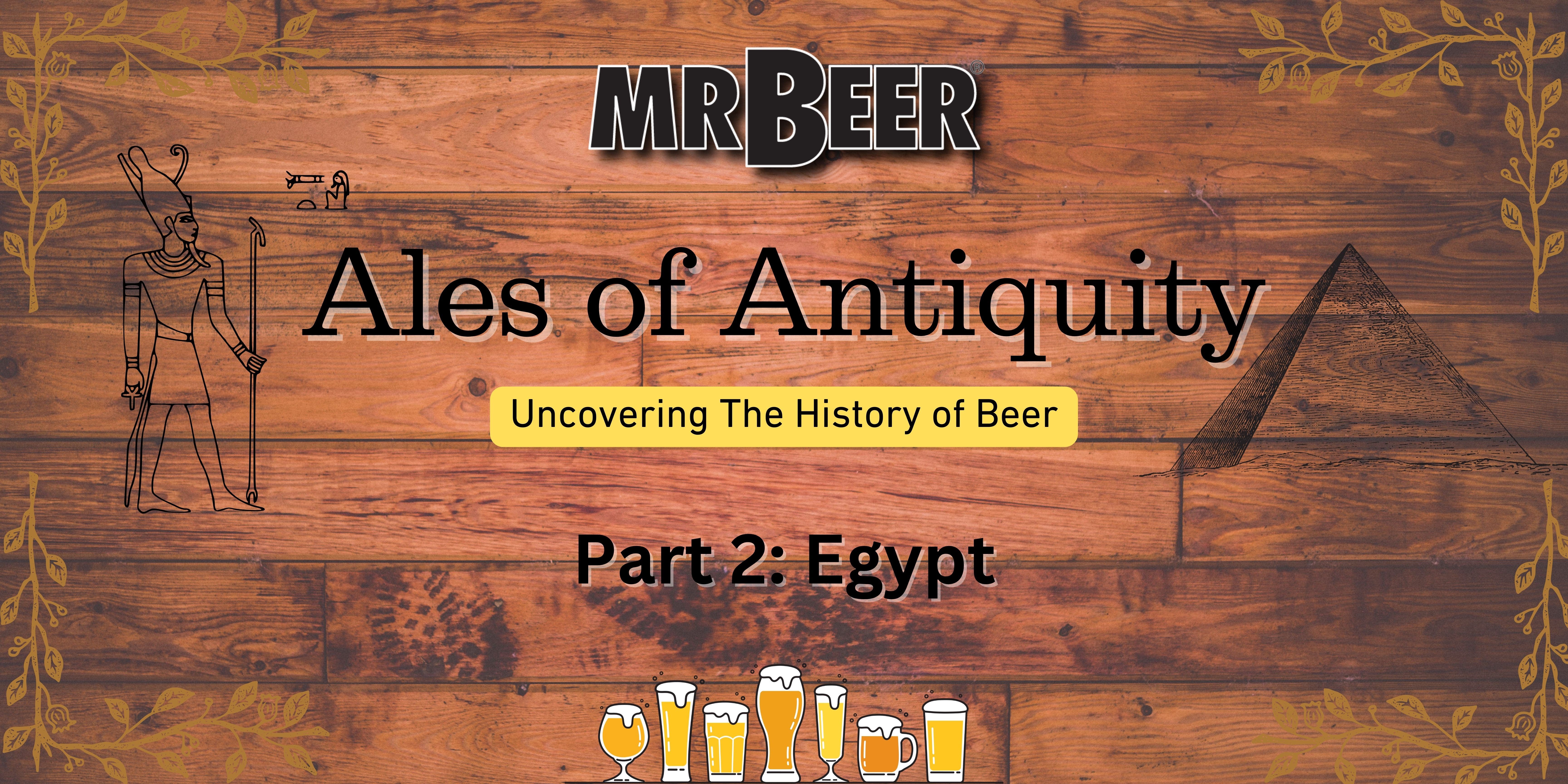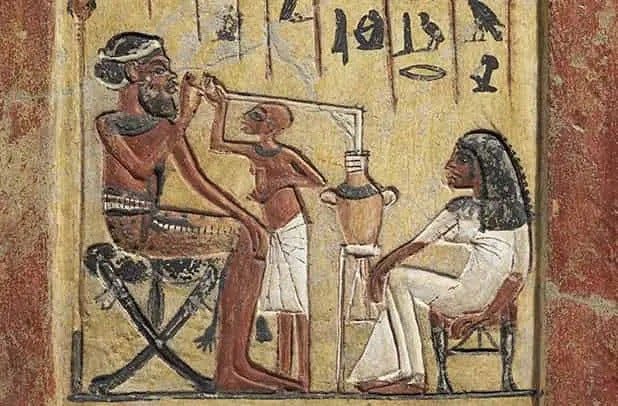Ales of Antiquity: Uncovering the History of Beer - Part 2: Egypt

This blog is part of a series exploring the history of beer and it's impact on society, agriculture, and technology. We will examine ancient recipes, techniques, and the people behind them. Each blog post will come with a homebrew recipe for you to try that uses a combination of ingredients from Mr. Beer and/or ingredients you can source elsewhere. We may not stock many of the more unusual items, but some recipes may contain alternative ingredients that are more locally accessible, or can be found on our website (links will be included).
Part 1: Beer in Egypt
Egypt - circa 4000 BCE:
The origins of beer in Egypt trace back to the dawn of civilization, making it one of the oldest known beverages in human history. The development of beer in Egypt was closely tied to the advent of agriculture, particularly the cultivation of grains such as barley and emmer wheat. These grains were crucial for both bread and beer production, forming the backbone of the Egyptian diet and agricultural economy. The consistent availability of these grains, thanks to the annual flooding of the Nile, provided a stable foundation for the development of brewing practices.
Early archaeological evidence, dating back to around 4000 BCE during the pre-dynastic period, indicates that beer brewing was already an established practice in Egypt. Excavations at sites like Hierakonpolis and Abydos have uncovered pottery fragments and residue suggesting early beer production. The ancient Egyptians likely inherited brewing knowledge from their neighbors, the Sumerians of Mesopotamia, who are credited with some of the earliest known brewing practices. This exchange of knowledge was facilitated by trade and cultural interactions between these early civilizations, allowing the Egyptians to adopt and refine brewing techniques.
Grain cultivation was fundamental to beer production in ancient Egypt. Barley and emmer wheat were the primary grains used, both of which thrived in the fertile soil of the Nile Valley. The annual inundation of the Nile River deposited nutrient-rich silt onto the fields, ensuring bountiful harvests. This agricultural abundance enabled the production of large quantities of grain, which were then used not only for food but also for brewing. The Egyptians’ ability to cultivate and store surplus grain was crucial for the continuous production of beer, making it a staple of their diet.
The brewing process itself began with malting the grains. Barley or emmer wheat was soaked in water to germinate, a process that converted the starches in the grain into fermentable sugars. Once germinated, the grains were dried to halt the germination process. This malting step was essential for creating the enzymes needed for fermentation. The malted grains were then ground into a coarse flour and mixed with water to create a mash. This mixture was heated to activate enzymes that further broke down the starches into sugars. Unlike modern brewing, the heating process in ancient Egypt was less controlled, often involving sun-drying or rudimentary kilns.
A unique aspect of ancient Egyptian brewing was the preparation of beer bread, also known as "bappir." The mash was formed into loaves and lightly baked. This bread was porous and not fully baked, ensuring that the yeast and enzymes remained active. The beer bread was then crumbled into a large vat or ceramic vessel and mixed with water. This mixture was left to ferment naturally. Airborne wild yeasts, as well as yeast present on the grain and bread, initiated the fermentation process. During fermentation, sugars were converted into alcohol and carbon dioxide, producing beer. Dates or other sweeteners were sometimes added at this stage to boost the sugar content and enhance fermentation.
The significance of beer in ancient Egyptian society extended beyond mere sustenance. It was a vital part of daily life, consumed by all levels of society, from laborers to nobility. The beverage provided essential nutrients and calories, making it an important source of sustenance, especially for those engaged in strenuous physical labor, such as the workers who built the pyramids. Workers were often paid in rations of beer and bread, underscoring the beverage's economic importance.
Beer also played a critical role in religious practices and rituals. It was commonly used as an offering to the gods and was integral to various ceremonies. The goddess Hathor, often associated with music, dance, and fertility, was particularly linked to beer. Festivals in her honor, known as the "Feasts of Drunkenness," featured extensive beer consumption, reflecting the beverage's integral role in religious and communal celebrations. Additionally, the myth of the sun god Ra and the goddess Sekhmet underscores beer's importance in mythology. According to the myth, Ra used beer to pacify Sekhmet's destructive wrath, saving humanity in the process.
Large-scale beer production took place in both domestic and commercial settings. Many households brewed their own beer for daily consumption, involving family members in the process and producing enough beer to meet their needs. Larger estates, temples, and palaces often had dedicated brewing facilities, producing beer on a much larger scale. These breweries supplied workers, temple staff, and provided beer for religious ceremonies. Archaeological sites like Abydos and Hierakonpolis have revealed remnants of these large brewing operations, providing insight into the industrial aspects of ancient Egyptian brewing.
The Legacy of Egyptian Beer:
The legacy of Egyptian beer extends beyond ancient times. The techniques and traditions of brewing in Egypt influenced later civilizations, including the Greeks and Romans, who adopted and adapted these practices. Today, the rich history of Egyptian beer is celebrated by historians and beer enthusiasts alike, offering a glimpse into the daily life and culture of one of the world's oldest civilizations.
In conclusion, beer was much more than a simple beverage in ancient Egypt; it was a vital part of their diet, economy, religion, and mythology. The history of beer in Egypt is a testament to the ingenuity and resourcefulness of the ancient Egyptians, whose brewing practices laid the foundation for the global beer culture we enjoy today.

Representation of a Syrian mercenary drinking Egyptian beer through a long rod, one of the typical filter rods for drinking beer.- circa 4000 BCE
Egyptian Ale
Egyptian Ale:
This recipe is very similar to the Sumerian ale. Brewing techniques and ingredients didn't change much between those 2 civilizations, however, the Egyptians most likely used more wheat than barley since enner wheat was a much more common staple in Egypt. Therefore, this recipe will be pretty much the same as The Sumerian Ale of the previous blog, but it will use more wheat than barley.
Brewing Notes:
This recipe uses the Mr. Beer little brown keg (lbk). It is a low ABV beer resulting in only around 3% ABV. Remember that this was a daily working class beverage that replaced unpotable water in some cases, so it wasn't very common for beer to have the higher alcohol content we see today. This beer also has no hops since they weren't used in beer until thousands of years later.
Due to the low ABV, this will only take 5-7 days to ferment. This is an ancient ale, so clarity of the beer isn't important.
Also, because of the low ABV, this beer has a short shelf-life and should be consumed within 7 days.
If you wish, you can add spices to your beer that may have been accessible in that time period and region. Some traces of cardamom, fennel, coriander, anise, and wild licorice have been found in ancient beer vessels, so these could optionally be used to flavor your beer.
Ancient beer, like Egyptian Ale, was not carbonated, though it may have a small amount of fizz if consumed fresh - right after fermentation has completed .
Ingredients:
• 3 - BrewMax LME Softpacks - Golden | Get it Here!
• 1 - Slice of Whole Grain Bread or 1/2 of a Barley Rusk | Source at your local grocery store.
• 1 - 2-Row Brewers Malt | Get it Here!
• 1 - Red Wheat Flakes | Get it Here!
• 1/2 cup Date Syrup or Honey | Source at your local grocery store.
• 1/4 cup raisins | Source at your local grocery store.
• 1 Pack Dry Ale Yeast | Get it Here!
• 1 - Muslin Sack | Get it Here!
• Spices to Taste (Optional) | Cardamom, fennel, coriander, anise, and wild licorice are a good start. Cinnamon, clove, etc may also be used. Be sure to use the minimal amounts so you don't over do it - just a pinch will do. Source locally.
Instructions:
STEP 1: Sanitizing
1. Fill clean keg with warm water to line mark 1 on the back, then add ½ pack (about 1 tablespoon) of No-Rinse Cleanser and stir until dissolved. Once dissolved, the solution is ready to use. Save the remaining ½ of No-Rinse Cleanser because you will need it for bottling.
2. Screw on lid and swirl the keg so that the cleaning solution makes contact with the entire interior of the keg, including the underside of the lid. Note that the ventilation notches under the lid may leak solution. Allow to sit for at least 2 minutes and swirl again.
3. To clean the spigot, open it fully and allow liquid to flow for 5 seconds and then close.
4. Pour the rest of the solution from the keg into a large bowl. Place your spoon/whisk, can opener and measuring cup into the bowl to keep them cleaned throughout the brewing process. Leave them immersed for at least 2 minutes in cleaning solution prior to using.
5. After all surfaces have been thoroughly cleaned, do not rinse or dry the keg or utensils. Return lid to top of keg, proceed immediately to brewing.
STEP 2: Brewing
1. Add the 2-row and wheat flakes to the muslin sack and tie it off at the end. Set aside.
2. Place BrewMax LMEs in a separate container of warm water to soften. Set aside.
3. Chop up raisins, or at least cut them in half to expose the interior. Set aside.
4. Using a clean measuring cup, pour 6 cups of water into your 4-quart or larger pot. Begin heating the water to a range of 155-160 degrees F and hold it at this range. Next, add the grain sack into the water and maintain the 155-165 temp for 30 minutes, then remove the grains and discard.
5. Bring the grain water to a boil. Once boiling, remove pot from heat and add the BrewMax LMEs to the boiled grain water and stir until dissolved. Also add the raisins at this time.
6. Fill the keg with cold water to line mark 1 on the back. The water must be cold (ideally from the refrigerator) with a temperature of 40-55°F/4-12°C. For the best results, we recommend using bottled spring water or filtered tap water. If using any other fermenter this would be approximately 1 gallon of water.
7. Pour the wort into the keg (raisins included) and then bring the volume of the keg up to line mark 2 by adding more cold water. Mix vigorously with a plastic spoon/ whisk. Be careful to not scratch the inside of the keg, which could create small spaces for bacteria to grow. (If you have a different fermenter top it off with cold water to the 8.5-liter mark). Also add the slice of bread or barley rusk at this time. Tear it into pieces for best results. Be sure it soaks up the wort and there are no dry spots.
8. Sprinkle the entire yeast packet into the keg and then screw on the lid. Do not stir.
9. Allow your fermenter to sit for 5-7 days before bottling.
Store the fermenter in a cool, dark place between 68-78°F/20-26°C for the yeast to work properly. The ideal temperature range is 70-72°F / 21-22°C. After a few days the foam and activity will subside and your batch will appear to be dormant. However, the yeast is still at work, slowly finishing the fermentation process.
STEP 3: Bottling
This beer is uncarbonated so it can be bottled and refrigerated right away. However, if you do wish to have carbonation, you can follow the normal Mr. Beer carbonating instructions found on any of our refills/recipes. Consume within 7 days.
- Brewing Basics & How-To's (203)
- Advanced Home Brewing Techniques (11)
- Seasonal & Specialty Brewing (12)
- Beer Culture & History (119)
- Recipes & Pairings (86)
- Brew School (21)





